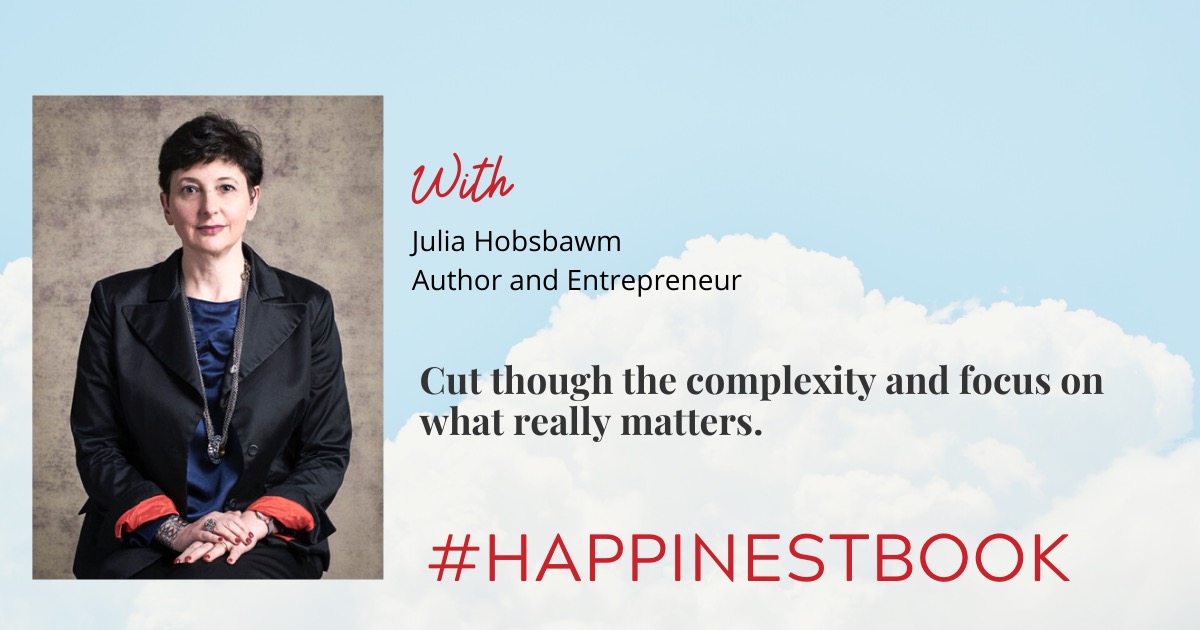Julia Hobsbawm is a writer, entrepreneur and acclaimed author. She was described by James Harding, former editor of The Times and BBC News and founder of Tortoise Media as “one of the most important public intellectuals in the UK.” Julia’s first book Fully Connected: Social Health in an Age of Overload, was shortlisted for Management Book of the Year and Business Book of the Year in 2018. Her new book, The Simplicity Principal: Six Steps Toward Clarity in a Complex World challenges the assumption that all things complex should stay that way. Julia shows us a simpler way, a way to keep things as lean, simple and focused as possible.
If you like what you hear, I’d really appreciate it if you would subscribe, rate and review the show. It’s easy to do on Apple Podcasts, or you can go directly to the podcast section of my website at judyhollandauthor.com.
Here’s what you’ll learn about in this episode:
• Before this coronavirus crisis hit, “we were all running at full tilt,” Julia says. The world already felt too complex and complicated. Technology was both convenient and liberating, but also did not make things easier.
• This is a massive opportunity for a reset. This is a moment in which we can ask, what are we doing that isn’t so great? What can we do better?
• Simplicity is not simplistic. It’s sophisticated. It takes courage and clarity to look at your life and make changes, to do more of this or less of that. That’s all part of making that busy-ness die down and focusing on what really matters. Don’t be busy for its own sake.
• Are you a multi-tasker, always exhausted and never feeling productive? Research shows multi-tasking is a myth. We have this fantasy that we can multi-task and can be multi-device, but it’s not really true.
• We live in a state of “infobesity” with too many ideas and too much stimulation and knowledge coming at us. Let’s cut through the complexity and focus on what matters.
• Cut out unnecessary meetings. Don’t reply to all those emails. Don’t deal with office politics. When this is all over, let us “connect to real human rhythm and real human desire.”
• We are invested in busy-ness. But we don’t thrive if we are constantly distracted and super busy. Distraction costs us.
• Don’t do more than six things. Don’t hang out in a meeting with more than six people. Divide your day into six time zones for completing separate tasks. Take two zones technology free. Don’t consume more than six sources of information daily. In ancient mysticism, six is a good number for flow.
• Simplicity is a form of peace and it comes from connecting with yourself, but it opens up space which can feel frightening. Stillness is a space to explore how your life is going.
• This pandemic is technology’s “big comeback moment.” Beyond the medical and economic disasters of coronavirus is “the big nightmare that it stops us from being what we are meant to be, which is social beings meant to be in each other’s company.” What human beings need above all else is intimacy.
• When we get back to being ourselves in restaurants, work places and parks, “that will be a great moment.”
• Be kind to yourself and other people around you. It’s a very fragile moment. Keep it real. Embrace simplicity.





